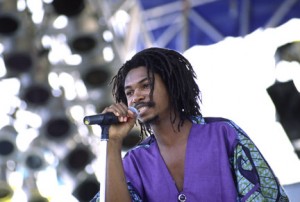By Howard Campbell—
This is sixth in an eight-part feature on the impact of women on reggae as artists, administrators and managers. Today we feature artiste manager Bridgett Anderson.
  ANDERSON… What we have seen in the last 10 years is people coming into the (music) business with a lot of money and they can afford to get their artists in the forefront (Photo: Garfield Robinson) ANDERSON… What we have seen in the last 10 years is people coming into the (music) business with a lot of money and they can afford to get their artists in the forefront (Photo: Garfield Robinson) |
AS reggae’s stocks rose in the 1980s, so did female managers who helped develop the careers of high-profile acts like Michael Rose, Maxi Priest and Beres Hammond. Bridgett Anderson joined that fray early in the next decade.
Anderson was part of the neo-roots movement that erupted in dancehall music during the 1990s. Her Firstborn Management handled the careers of singers Jahmali, Jahmel, Natty Remo and a charismatic vocalist from Manchester named Garnet Silk.
The local reggae circuit was dripping with talent then, but Anderson believes things are much different now.
“What we have seen in the last 10 years is people coming into the (music) business with a lot of money and they can afford to get their artists in the forefront. Many of these artists don’t necessarily have any talent,” she told the Jamaica Observer.
Firstborn Management is still a registered company, although Anderson says it is on hiatus. She still guides younger acts like the Uprising Roots band and singer Samory-Our, as well as veteran roots artist Fred Locks.
Much of Anderson’s time these days is spent running Nature’s Eyes, a décor company that provides backdrops for major live shows like Reggae Sumfest and Western Consciousness and events by the Jamaica Football Federation.
“Music is my first love but this (professional decorating) has always been something I loved. It’s different from what people know me for, but not new,” she said.
Anderson entered the music business as road manager for singer Judy Mowatt in the early 1990s, shortly after joining the Twelve Tribes of Israel. Her previous job was selling furniture to north coast hotels such as Hedonism II and Grand Lido, for the Skill Craft company.

It was while working with Mowatt that she first met Silk at the Eastern Consciousness show in Portland in 1992. At the time, the Manchester-born singer had a minor hit with a cover of Ray Charles’ Seven Spanish Angels and was still making the sound system rounds.
According to Anderson, she was introduced to Silk and his songwriting partner Anthony Rochester by their close friend, deejay Tony Rebel.
“(Producer) Donovan Germain was doing most of his business then but I really managed his transition from sound system to live artist. It was a time of slackness and gun talk, and Garnet came in when the music needed cleaning up,” Anderson recalled.
While with Firstborn, Silk emerged as a leader of the roots revolution, thanks to songs like It’s Growing and the album of the same name. With success, however, came challenges.
In late 1993, he fainted before a show in the United States and took a break from recording and touring. In December, 1994 he was killed in a fire at his mother’s home in Manchester.
Anderson was no longer managing Silk at the time, but had seen him two days before his death at deejay Kulcha Knox’s home in St Andrew. She remembers getting the tragic news through an early-morning telephone call.
“I was at a loss for words…Garnet was an awesome human being. When he was going on stage he always said, ‘wi a go save some souls now’.”
Rasta and the music business were not in the script for Bridgett Anderson in the early 1970s. She is the eldest of three daughters for Woodrow Anderson, who rose to the rank of assistant commissioner in the Jamaica Constabulary Force, and Olga Bryan-Anderson (now deceased) who was a superintendent of police.
Anderson attended the well-heeled St Andrew and Mount Alvernia high schools and lived for a time in Canada where she developed a love for disco and Rhythm and Blues. Back in Jamaica, she got into reggae through following the Third World band and attending live shows like Reggae Sunsplash.
After Silk’s death, Anderson and Firstborn helped chart Jahmali’s breakthrough with the song El Shaddai, a big hit in 1998. While Nature’s Eyes is her main focus, Anderson says there is one musical project she would pursue in a heartbeat.
“Twelve Tribes has a music catalogue that is second to none because we have produced so many great artists. Releasing a box set of our songs is something I’d love to get involved with.”


You must log in to post a comment.